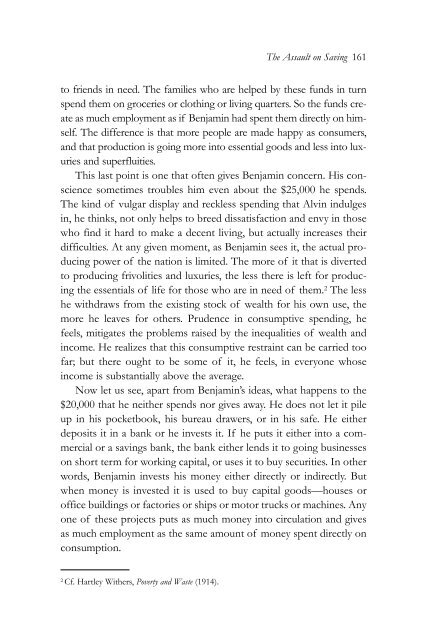1gDdM7w
1gDdM7w
1gDdM7w
- No tags were found...
You also want an ePaper? Increase the reach of your titles
YUMPU automatically turns print PDFs into web optimized ePapers that Google loves.
The Assault on Saving 161to friends in need. The families who are helped by these funds in turnspend them on groceries or clothing or living quarters. So the funds createas much employment as if Benjamin had spent them directly on himself.The difference is that more people are made happy as consumers,and that production is going more into essential goods and less into luxuriesand superfluities.This last point is one that often gives Benjamin concern. His consciencesometimes troubles him even about the $25,000 he spends.The kind of vulgar display and reckless spending that Alvin indulgesin, he thinks, not only helps to breed dissatisfaction and envy in thosewho find it hard to make a decent living, but actually increases theirdifficulties. At any given moment, as Benjamin sees it, the actual producingpower of the nation is limited. The more of it that is divertedto producing frivolities and luxuries, the less there is left for producingthe essentials of life for those who are in need of them. 2 The lesshe withdraws from the existing stock of wealth for his own use, themore he leaves for others. Prudence in consumptive spending, hefeels, mitigates the problems raised by the inequalities of wealth andincome. He realizes that this consumptive restraint can be carried toofar; but there ought to be some of it, he feels, in everyone whoseincome is substantially above the average.Now let us see, apart from Benjamin’s ideas, what happens to the$20,000 that he neither spends nor gives away. He does not let it pileup in his pocketbook, his bureau drawers, or in his safe. He eitherdeposits it in a bank or he invests it. If he puts it either into a commercialor a savings bank, the bank either lends it to going businesseson short term for working capital, or uses it to buy securities. In otherwords, Benjamin invests his money either directly or indirectly. Butwhen money is invested it is used to buy capital goods—houses oroffice buildings or factories or ships or motor trucks or machines. Anyone of these projects puts as much money into circulation and givesas much employment as the same amount of money spent directly onconsumption.2Cf. Hartley Withers, Poverty and Waste (1914).


